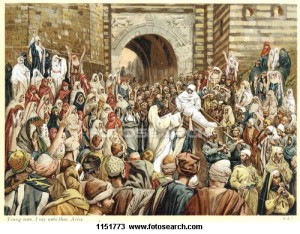WIDOWS AND ONLY SONS
(A biblical reflection on the 10th Sunday in Ordinary Time [Year C]- June 9, 2013)
First Reading: 1Kings 17:17-24; Psalms: Ps 30: 2,4-6,11-13; Second Reading: Gal 1:11-19; Gospel Reading: Luke 7:11-17
The movie entitled WITNESS tells the story of an Amish widow and her 5-year-old son. The little boy witnesses a murder committed by a police officer and becomes a murder target himself in a police cover-up.
Throughout this fast-paced movie of intrigue, suspense and narrow escapes, we share in the worries and fears of the Amish widow trying to protect her only son. We find our hearts reaching out with compassions toward her: “Good Lord,” we pray, “she’s already lost her husband. Don’t let any harm come to her little boy now.”
These feelings aroused in our hearts by the movie WITNESS are the same as those felt by Elijah and Jesus in today’s readings. In parallel stories, both Elijah and Jesus encounter widows who have just lost their only sons. The hearts of Elijah and Jesus are moved with pity, and they bring the sons back to life.
To appreciate the impact of these miracles, we must recall that in the Bible the widow was a frequent symbol of the poor and the helpless. In biblical times there was no job market for women, nor was there any welfare system as we know today.
So when Elijah and Jesus come across a widow who has lost not only her husband (which is bad enough), but also (to make matters worse) her only son, they meet someone who is indeed the poorest of the poor in their time. So they are moved with compassion to restore the women’s sons.
Commentator William Barclay remarks that, on the one hand, these stories are unparalleled for their pathos and poignancy in presenting human misery. But, on the other hand, they are overpowering for their revelations of divine mercy.
If we focus on just the gospel story, we find that it is highly symbolic.
First, the two crowds which converge. One crowd is a funeral procession following a dead man. the other crowd is a group of disciples following Jesus, the Lord of life. For a moment, life triumphs over death, a foreshadowing of the more definitive triumph that will take place later when Jesus Himself will be raised from the dead once and for all.
Second, in the opening episode of this chapter, Jesus healed a centurion’s servant who was sick to the point of death. In today’s episode, Jesus restores a young man who had passed beyond the point of death. By putting these two stories together consecutively, Luke is making a significant statement: no suffering is beyond God’s power to relieve; no death is beyond God’s power to conquer.
Third, there is the element of faith. In previous miracle stories, like that of the centurion’s servant, faith was at work in the recipients beforehand. But here, in the widow of Naim story, faith is neither demanded nor sought beforehand. Instead, it is given as a gift afterwards. The whole incident is charged with God’s gracious and unconditional love.
Is this not the way God intervenes sometimes in our lives, too, when we’ve done nothing to earn or merit His amazing grace? Even when He’s uninvited, He sometimes invades the ground of our being and brings unexpected blessings for us.
Inspiring as the widow of Naim story is, it still leaves some of us asking: “If God is so good, why didn’t He bring back to life my husband or wife when they passed away? Why didn’t He restore my son or daughter when they died?”
Perhaps the only answer is: The Lord did not raise them from the dead when we wanted – but one day, in His own time, He will.
What is needed from us are not more questions, but silence in the presence of God; not more demands or ultimatums, but trust as we place our destiny in His hands.
Note: Taken from Fr. Albert Cylwicki CSB, HIS WORD RESOUNDS, Makati, Philippines: St. Paul Publications, 1988, pages 258-259.
